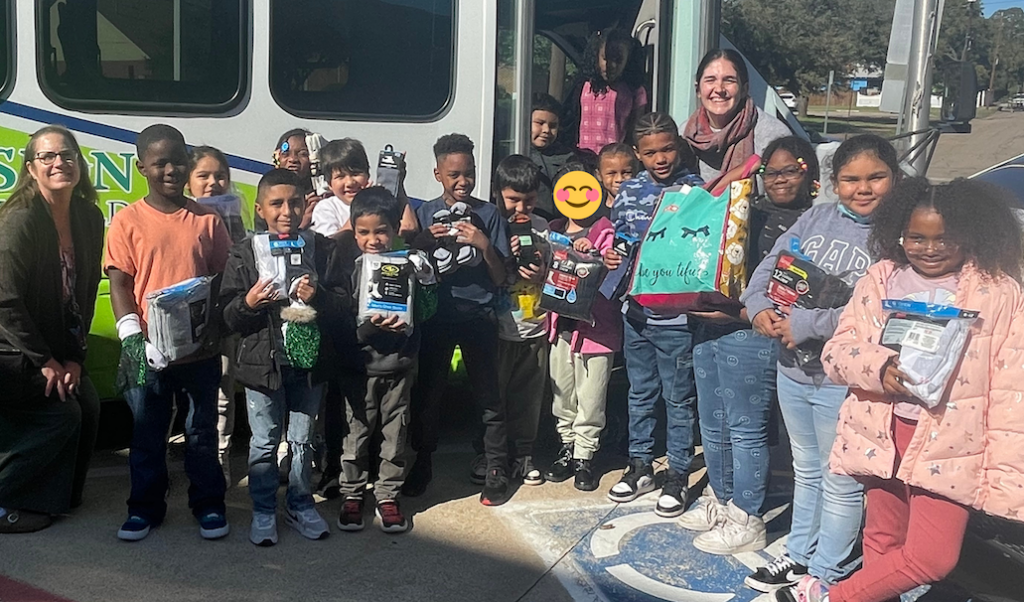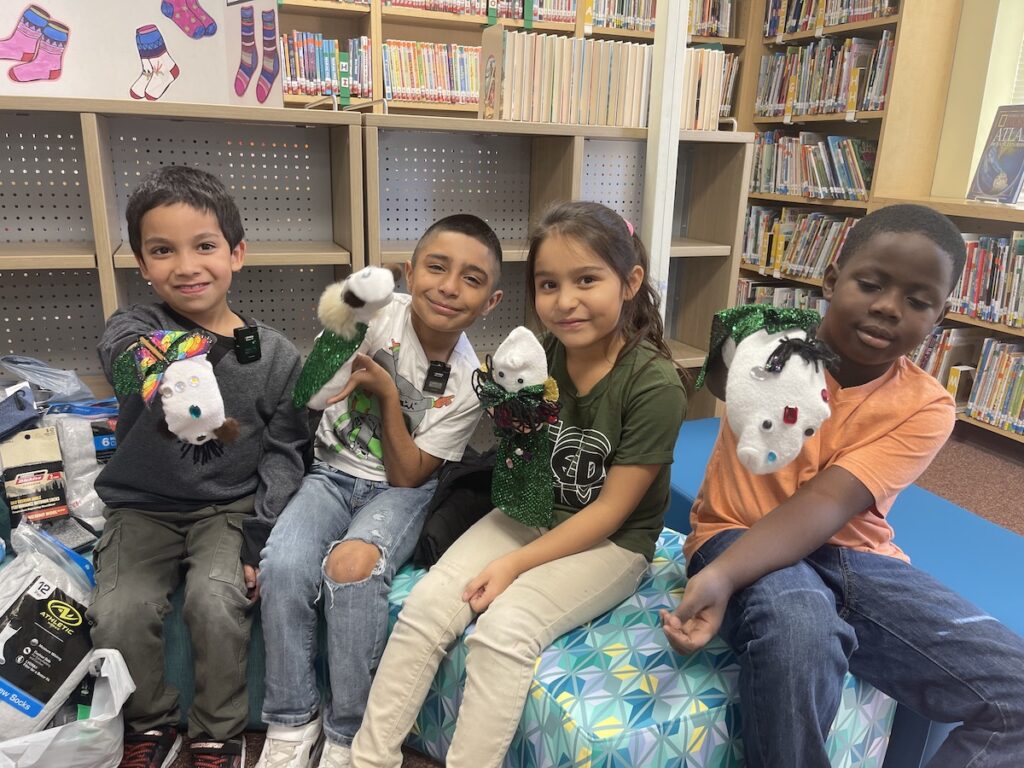Waterparks Open to the Public Mother’s Day Weekend
Moms are the heart of every household. They know what we need before we even ask. And they rarely ask for anything in return. To honor them, Hawaiian Falls Waco is inviting Moms to enjoy complimentary admission Mother’s Day weekend when the waterparks open to the public.
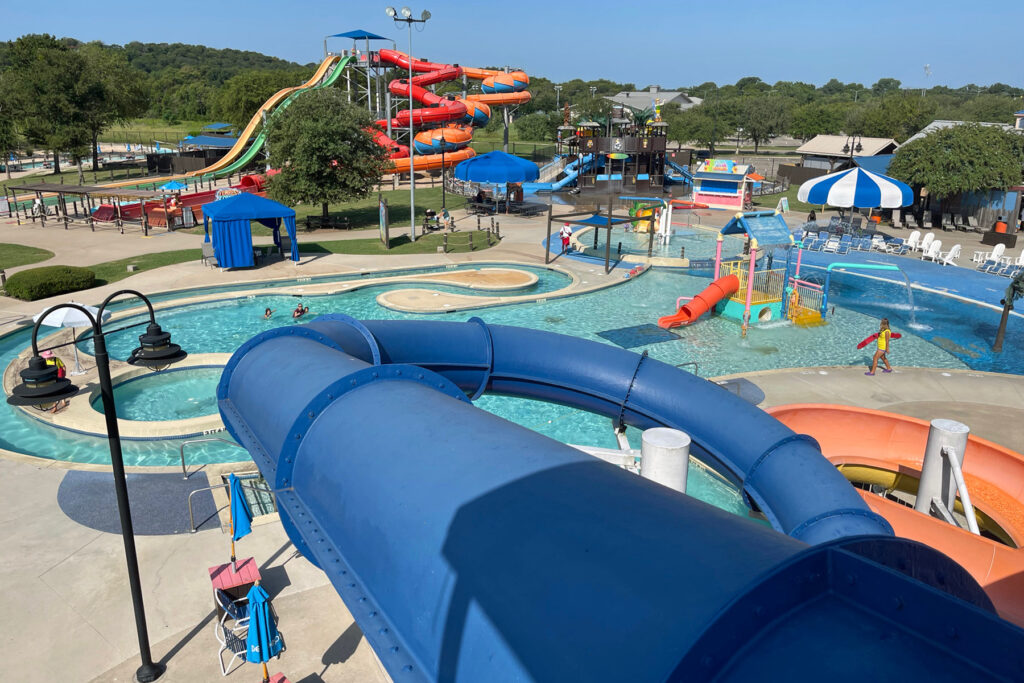
Photos by David Alvey
In addition to free admission, Moms will receive a special Hawaiian-themed gift (while supplies last) Saturday, May 13 and Sunday, May 14.
“We’re inviting mothers of all ages to come enjoy a day at the park to thank them for their selfless roles as cook, chauffeur, activity director, nurse, and countless other tasks they do for their families,” said Hawaiian Falls Marketing Director Ron Mckenzie. “We want Moms to enjoy a carefree day where others can wait on her. Float down the Lazy River and feel the stress melt away or recline in the shade and enjoy a cold drink while Dad races the kids down a slide. We want Mom to take away memories she’ll never forget.”
Hawaiian Falls will officially kick off the summer season with free admission to all active duty and retired military personnel with a valid Military ID Memorial Day Weekend, May 26 – May 29. The parks will be open daily beginning Friday, May 26.
Other special events planned throughout the summer include:
- Father’s Day weekend – Dads get in free June 17 – 19
- Champions Day – June 20 and July 22 Champions (individuals with special needs) and their families will have exclusive access to the park from 9 am -10 am. Champions tickets are FREE and family companion tickets are only $10 (limit 4).
- World’s Largest Swimming Lesson – June 22
- Independence Day weekend – Active duty and retired military personnel as well as first responders receive free admission.
- Aloha Fest – July 15 in Roanoke, July 22 in Mansfield, and July 29 in Waco.
- Family Fun Fridays throughout July with Ohana Games led by Hawaiian Falls Activity Director.
Season passholders can visit their home park to process their passes from 4 p.m. – 6 p.m. May 8 – 12 at the park’s front gate.
Hawaiian Falls Waterparks are located in Mansfield, Roanoke and Waco. More information about special events, operating hours, directions, tickets and season passes, are at hfalls.com.
By: Dr. Peaches Henry
I am relieved that the Llano County (Texas) commissioners kept their library system open and returned banned books to the library shelves. Yet, I am dismayed that Missouri’s House voted to cut all funding for libraries in its version of the state’s annual budget, because the American Civil Liberties Union, the Missouri Association of School Librarians, and the Missouri Library Association are suing the state over the censorship of some books from school libraries across the state. I do not intend to litigate the practice of banning books here. [To get my view on that, see my 1992 essay “The Struggle for Tolerance: Race and Censorship in Huckleberry Finn.”] Instead, during National Library Week (April 23-29), I want to celebrate the Waco McLennan County Library for the profound way it touches the lives of Wacoans.
Our library provides essential services to children, families, individuals, and the community at large. A truly remarkable place, the public library provides safe, accessible, one hundred percent free educational resources to everyone. It pools local resources like educational offerings, job training, and computer or internet access and puts them all in one place for use by the whole community. Whether you are a family looking for a fun story time, an immigrant looking for language help, a student working on a History Fair project, a person needing help on their taxes, or a homeless person looking for a place to cool off, you can find them all at the library—a place that has undergone transformation that makes it an altogether different place from the one previous generations enjoyed.
Indeed, the modern public library that serves Waco McLennan County is not your grandparents’ library. These days, there is more to the story when it comes to the library which provides services far beyond the traditional task of checking books in and out. Even that has been transformed. Patrons can access ebooks, emagazines, and audiobooks in the CloudLibrary and read them anywhere. They can also check out a mind-boggling range of “Special Items” which include blood pressure kits, sensory backpacks for specials needs children, disc golf kits, discovery boxes, and puppet kits. Special Items educational kits include flash cards, literacy kits for preschoolers, and STEAM kits for upper-elementary children. Among the most prized of the special items are the free family passes to local museums and sites including the Mayborn Museum, Cameron Park Zoo, and the Dr. Pepper Museum to name a few. The library’s Special Items collections offer free access to materials that many families cannot afford to purchase.
The library also boasts numerous, varied children’s programs aimed all ages. Everything from themed storytimes (money smart, STEAM, or super hero) to painting to a Minecraft and Roblox club to a look behind-the-scenes tour of the library to summer reading programs is available to children. As a member of the Library Commission, I was delighted to judge the library’s inaugural Edible Book Festival on April Fool’s Day.
In addition to catering to children, the library also offers essential support to adult Wacoans. It maintains partnerships with local entities which deliver needed services. The Heart of Texas Goodwill, for instance, holds computer skills and financial literary classes at the library. The Heart of Texas Workforce Solutions gives free one-on-one job skills training. The library hosts books clubs such as Books & Brew or the Mystery Book Club. It sponsors adult programs such as healthy crock pot cooking, an adult anime and manga club, and free tax preparation not to mention the work of the Genealogy Center.
The modern Waco McLennan County Library is a completely different place from the old Palestine Carnegie Library that I used to walk to as a child. Yet, in the most meaningful way, it remains the same iconic institution that I grew up with. The library is still the community hub that connects people to information, offers essential services and resources, brings people together, encourages lifelong learning, provides safe havens for children and adults, helps build healthy communities, and transports individuals around the world and to other worlds. Like libraries around the state and nation, our local library is an important public institution that we must support and protect now more than ever.
Dr. Peaches Henry is a member of the Waco McLennan County Library Advisory Commission.
The “Henrietta Napier Changemaker Awards” will identify one outstanding person for their service and excellence in each of the following areas: Public Health, Health Care, Social Work, Nutrition, Housing, Social Justice, Education and Unsung Hero. The award winners will be recognized and receive a commemorative plaque to be presented at the Henrietta Napier Expo, which will be held July 16, 2022.
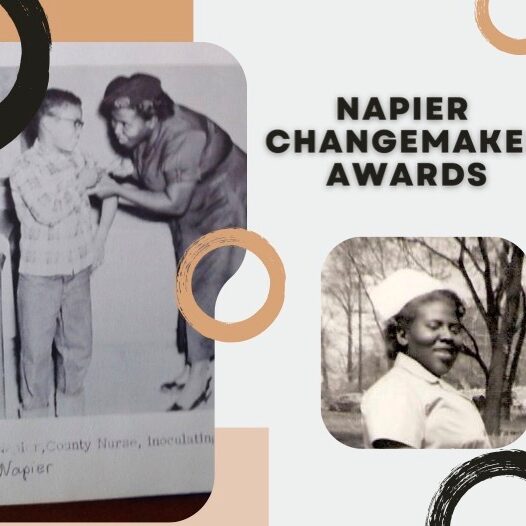
Background
Mrs. Henrietta Napier was hired as the first African American Public Health Nurse in McLennan County in 1954. She served in that capacity for 42 years for what is currently known as the Waco-McLennan County Public Health District. She was well known by many as the school nurse who gave shots as well as the nurse who cared for so many pregnant women and children. She also worked in the areas of well child health, Tuberculosis Control, and home visiting. Her compassion and dedication to her community was exemplary. Many clients came to the Health District during her tenure and long afterwards seeking her assistance. She was always professional and compassionate in the care she provided clients and co-workers.
St. Luke African Methodist Episcopal Church, Prosper Waco and Waco-McLennan County Public Health District wish to actively recognize and honor the outstanding service, dedication, and excellence of individuals who serve their communities in addressing the Social Determinants of Health (Health Care Systems, Community and Social Context, Food, Neighborhood and Physical Environment, Education, and Economic Stability). The awards will be given to individuals who work in the areas of Public Health, Health Care, Social Work, Nutrition, Housing, Social Justice Education and Unsung Hero. With the exception of Unsung Hero, the other disciplines are self- explanatory. The Unsung Hero award will be given to a representative serving as a Certified Nurse Assistant (CNA) or Medical Assistant (MA).
Nomination Process
1. Nominations may be submitted by another individual or directly by the nominee.
2. Nominations are to be submitted no later than 5:00 p.m. CST on Friday, May 27, 2022. Late applications will not be accepted.
3. The Nomination Review Committee, made up of Prosper Waco’s Access to Healthcare working group and Henrietta Napier Expo committee members, will review the nominations using an evaluation score sheet to select winners.
4. All submissions must be complete. Incomplete applications will not be considered.
PLEASE NOTE:
All questions should be submitted to Dr. Carolyn Scott, Ph.D. at [email protected] and Sherry Williams at [email protected], Questions will be answered as quickly as possible.
By Ferrell Foster
An encounter with a stranger haunts me.
Last month, in the midst of the winter storm, we decided to flee our powerless house for my daughter’s house in another town. It was Tuesday afternoon. We had been without power almost all of the time since 8 a.m. Monday. The temperature had dropped to 2 or 3 degrees outside Tuesday morning.
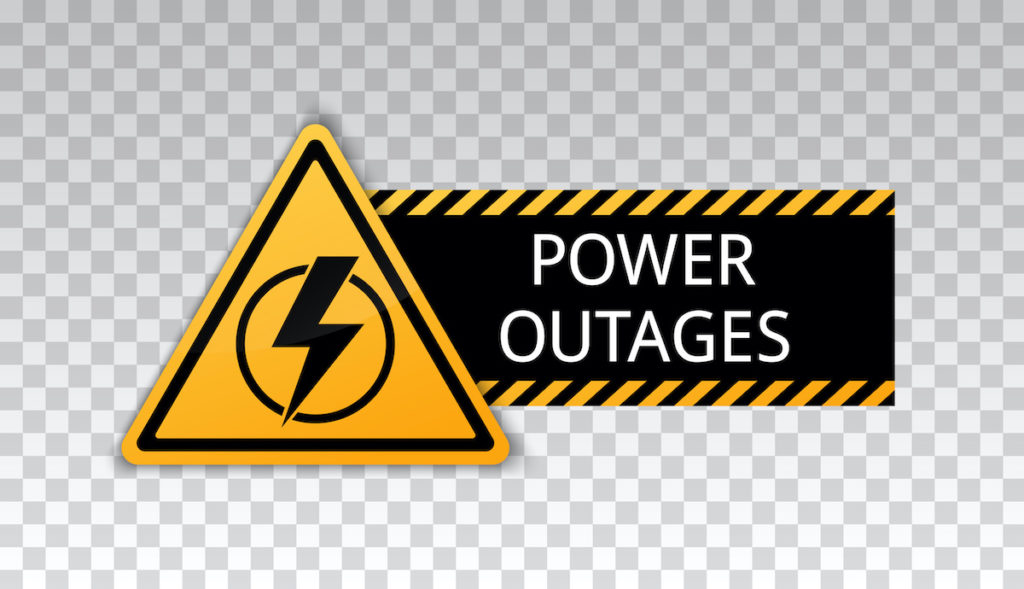
We motored northward and stopped a little north of town to get gas. Inside the store, I stood in a two-pronged line waiting to check out.
A woman, shorter than me and probably not as old as me, took her place in the line adjacent to me. She smiled big and had a happy lilt in her voice.
“We haven’t had power in two days,” she said.
“I know. We’ve been without power, too,” I responded.
“It got down to 27 degrees in our house last night,” she said, still with a bit of mirth in her voice.
“Oh, my,” or something like that, was all I could say.
Lines advance. She checks out; I check out. We go our ways.
So why can’t I forget this encounter? For a simple reason.
The woman and I both lived through a powerless night when the temperature outside dropped almost to zero. She lived in a 27-degree icebox of a house. The temperature in our house never dropped below 52.
People with resources encounter some of the same challenges in life that those with less resources face, but we do not deal with these challenges on equal footing. Not only did my house keep my family and me much warmer than this woman’s, but we also had someplace to go.
One of my daughters stood in the line with me. After we left, I commented on the woman’s situation in contrast to ours, and Tabitha noted that the woman still seemed to have on her pajamas with a house coat on top. I hadn’t noticed.
This woman was not dressed for travel. Chances are she headed back to her icebox and had to wait who knows how long for relief. Still, she smiled.
Driving northward, Tabitha read me a news account of the power outages in East Waco. This story included a quote from my friend, Waco Council Member Andrea Barefield. She spoke to the importance of alleviating the infrastructure problems in East Waco.
Our neighbors who are most in need should be our highest priority. People in poorer neighborhoods should have the absolute best when it comes to streets, water, and power because they already have enough challenges.
Why is it so often the other way around in cities across this country? It doesn’t have to be; Waco can be different. We can give our best to those who have the least.
We stand or sink together as a community from East Waco to North and South and West. We are Waco; we seek our best.
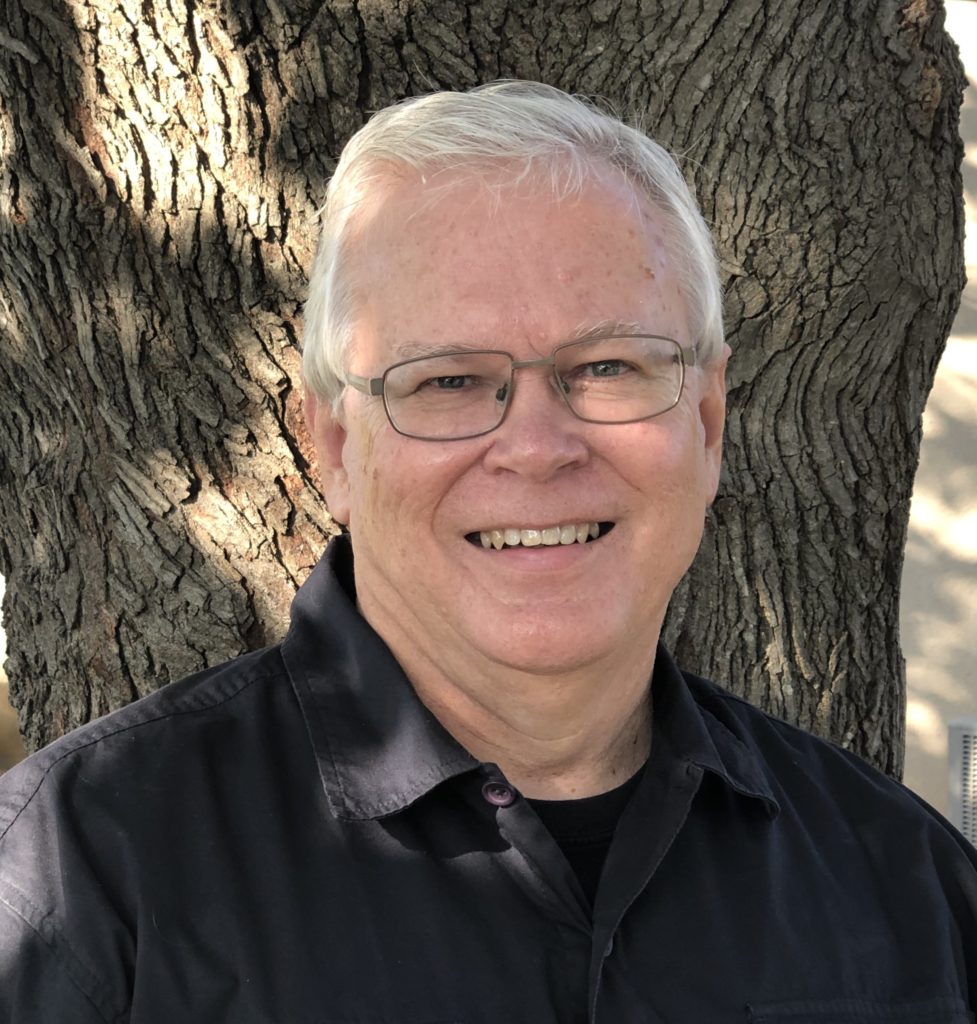
Ferrell Foster is acting executive director of Act Locally Waco and senior content specialist for care and communication with Prosper Waco.
(During these last few weeks of December we will be reprising the Top 10 Most Opened Blog Posts for 2018 from the Act Locally Waco blog. I couldn’t possibly pick my favorites – so I used the simple (cop out?) approach of pulling up the 10 blog posts that got the most “opens” according to our Google Analytics. It is an intriguing collection that gives at least a little insight into the interests and concerns of Act Locally Waco readers. I hope this “Top 10” idea inspires you to go back and re-read your personal favorites. There have been so many terrific ones… If you would like to see the Top 10 according to Google Analytics, here’s the link: Top 10 Most Opened Blog Posts of 2018. Merry Christmas! — ABT)
By Christy Perkins
The Community Health Worker Initiative is an innovative program designed to bridge the gap between the community and available resources. The program methodically targets 4 zip codes in Waco that could benefit from these resources: 76704, 76705,76706, and 76707. As Community Health Workers (CHW) we are trained to respond to cultural diversity with understanding and acceptance to help clients overcome barriers to using the available health resources. Our role is to connect clients to resources and help them navigate the healthcare system. By doing so, we help individuals reach a state of self-sufficiency to create a healthy and thriving community. We aim to build trusting relationships with our clients, to increase basic and critical health education that will develop confidence in those facing adversity, and to decrease unnecessary emergency (E.R) visits.
In 2016, I began purposefully researching and embedding myself into organizations and projects that are geared toward advocacy and health. I became passionate about client advocacy after personal life experiences left me in the dark about such services. When my oldest son fell ill as an infant, I didn’t know that patient advocates were available to help me manage this uncertain and scary time in my life. No one stepped in to advocate on our behalf by making me aware of available services that could support my son. That is when I became prayerful and intentional in regard to advocacy and awareness. I grew interested in holistic methods of health during that time and now find myself on the path to become more educated in this area. I saw this opportunity with the Waco-McLennan County Public Health District as a foot in the door to professionally connect to, advocate for, and educate individuals who have been left in the dark like I once was. I aspire to be a voice for those who feel their voice has been silenced.
In preparing to become a CHW, my coworkers and I underwent 160-hours of training over the course of 4 months to become certified by the Texas Department of Human Services (TDHS). The training covered 8 core competencies: communication, interpersonal, service coordination, capacity building, advocacy, teaching, organizational, and knowledge base skills. During training, we began attending coalition meetings, community meetings that were open to the public, toured facilities of community organizations, and had several guest speakers who assist the community explain their services. Additionally, I’m an active participant in Leadership Plenty, Round 7, which builds skills in community leadership, managing conflict, diversity, and taking action. The CHW training together with the leadership training are important tools when working with clients and partners.
Now that my fellow CHW’s and I have completed our training, we are preparing our first project! We will be hosting launch parties in the 4 zip codes that are the focus of this program. This will be an opportunity for the community to become familiar with the CHW’s assigned to their neighborhoods as well as enjoy the festivities that we and our community partners will have available to the families. Check out our new Facebook page — McLennan County Community Health Worker Initiative — for updates on these events!
I am truly looking forward to helping my CHW team in piloting this program. I feel the beauty of this program is that we are able to meet our clients where they are in their current life situation and create an action plan that is attainable within our capacity. My hope is to assist them with self-reliance when developing goals they desire to achieve and that will be beneficial to their well-being. In turn, creating a partnership with those clients to assure them I am dedicated to their personal successes. I will strive to access integrative resources on their behalf while preparing them to confidently do so independently. My personal goal is to specialize in nutrition and help guide others in holistic lifestyle choices to improve their quality of life.
I look forward to continuing to build relationships with community partners to tackle the problems of our community by collecting information at the grassroots level that will support and develop this program. We will be working closely with the healthcare system in Waco to assure that this program is effectively aiding the community.
I’m looking forward to working with my fellow CHW’s in beginning walking groups within the communities we are serving. This is an example of the kinds of efforts that will help us connect with fellow residents and encourage healthy lifestyle routines. This is an exciting time for us as we embark on a mission that will shape a program that has been conjured up through discussion, data development, and planning for years. What an honor it is to be entrusted as the charter group to thrust this project into a flourishing program!
 Christy Perkins is a certified Community Health Worker for zip code 76707. She currently serving on the Garden Committee at Brook Avenue Elementary. She is looking forward to becoming a graduate of the prestigious leadership training with the Leadership Plenty Institute in March of 2018 and serving on the YMCA, Young Junior Professionals Board. When she isn’t involved in community work, she is a Mother of 3 handsome boys. They keep her life busy and entertaining. She has a passion for writing, reading, and fellowship. She is originally from Amarillo, Tx but has grown to love Waco, Tx and is looking forward to building a future here. You can reach her at [email protected] or on Facebook at McLennan County Community Health Worker.
Christy Perkins is a certified Community Health Worker for zip code 76707. She currently serving on the Garden Committee at Brook Avenue Elementary. She is looking forward to becoming a graduate of the prestigious leadership training with the Leadership Plenty Institute in March of 2018 and serving on the YMCA, Young Junior Professionals Board. When she isn’t involved in community work, she is a Mother of 3 handsome boys. They keep her life busy and entertaining. She has a passion for writing, reading, and fellowship. She is originally from Amarillo, Tx but has grown to love Waco, Tx and is looking forward to building a future here. You can reach her at [email protected] or on Facebook at McLennan County Community Health Worker.
The Act Locally Waco blog publishes posts with a connection to these aspirations for Waco. If you are interested in writing for the Act Locally Waco Blog, please email [email protected] for more information.
By Craig Nash
One of my favorite pastimes as a Wacoan is talking about Waco. Of the small handful of places I have lived in my life, none have been as self-reflective as this community. This has been the case at least since I moved here in the summer of 2000, and has reached new levels of intensity over the past few years as cameras have been rolling and downtown booming. In those early days all our talking was about potential. “If only” type conversations. We still talk about potential a lot, but enough “If onlys” have occurred that we have allowed those conversations to happen less frequently.
But as much as I love talking about and reflecting on the life of this city, I enjoy more the times spent on my block full of individuals and families who aren’t expending a lot of energy thinking and talking about Waco, its potential, past or current status. I live in Sanger Heights, but within seven blocks of my house are the Brook Oaks, North Waco, Dean Highland, Brookview and Heart of Texas Neighborhoods. It’s the nexus of the Waco solar system, really, and it contains multitudes. As far as I can tell, no one on my block are close friends with anyone else on the block. We don’t have neighborhood parties or borrow sugar and eggs from each other. But we are neighborly.
For the first 2-3 years I lived in my current house, there was a lot of transition on the block and, perhaps connected, a lot of crime. My immediate neighbors to the north had lawn mowers and air units stolen. There were gunshots regularly. I had 7 break-ins within a three year span. I can’t be sure if they stopped because I finally got a home alarm system or word just got around that I owned nothing of value, but overall it has become a quiet, peaceful neighborhood.
I’ve seen kids grow up in the neighborhood. Luis, who was eight when I first moved in, is now a senior at Waco High. I once bought him a new soccer ball because my dog destroyed one he accidently kicked into my back yard. Ever since, he has rolled my trash bin back to the house from the curb in the evening about once a month. I’m not saying this is a deliberate long-term exchange of kindness on his part, but I like to think it is. Every time I am seen doing work on the exterior of my house, (which, as anyone who has seen my house knows, isn’t that often,) Luis’ dad, Miguel, asks me if I am moving. He is always relieved when I tell him I have no plans to move anytime soon. In his broken English he tells me how much he likes the current stability of the neighborhood. He doesn’t use those words, of course, but just says, “I’m afraid of new people moving in all the time.”
There is a new family in the neighborhood, though, that has changed things for us. Jayden acts and talks like an 11 year old, because he is 11 years old, but looks like a 15 or 16 year old. He’s brightened the place up. He knocks on every door in the block asking if any of us have work for him, but really he just likes to talk. When he first arrived he offered to mow my yard for $2. Still under the impression that he was older than what he is, I obliged, and SHOCKED him when I told him I’d pay him THREE TIMES what he was offering. When I looked out and saw that he didn’t really know what he was doing, (mowing in squiggly lines and circles,) I asked if he’d ever mowed a yard before. He said, “Yeah, I just mowed YOUR yard.” Containing my laughter I asked and discovered his real age. Not only did I get a cheap lawn service that day, I also got an opportunity to teach an 11 year old how to mow a lawn, as my dad had taught me when I was a kid.
I should mention that I am the only white person on my block. It’s not the first “majority minority” neighborhood I’ve ever lived in, but it is the first time where the disparity has been so prominent. I think this has given me a small sliver of understanding of how people of color have to exist in the “white people” world every minute of every day. It has made me more understanding, but mostly I enjoy the birthday parties where I am awakened from my slumber to look out the window to see a real-live mariachi band. Like the hip-hop music occasionally blaring from the speakers of my other neighbors, I don’t complain, and no one has ever called the cops on me for listening to the Grand Ole Opry too loud on Saturday nights.
We’ve all come to a silent understanding that we are neighbors. We’ll look out for each other if we need to. We’ll avert our eyes from time to time when we need to. But mostly, we will create a community simply by existing peacefully with each other in the same place. This is our Waco, the one we love, and we’re ok not talking about it with each other.
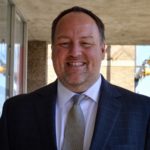 Craig Nash has lived in Waco since 2000. Since then he has worked at Baylor, been a seminary student, managed a hotel restaurant, been the “Barnes and Noble guy,” pastored a church and once again works for Baylor through the Texas Hunger Initiative. He lives with his dog Jane, religiously re-watches the same 4 series on Netflix over and over again, and considers himself an amateur country music historian.
Craig Nash has lived in Waco since 2000. Since then he has worked at Baylor, been a seminary student, managed a hotel restaurant, been the “Barnes and Noble guy,” pastored a church and once again works for Baylor through the Texas Hunger Initiative. He lives with his dog Jane, religiously re-watches the same 4 series on Netflix over and over again, and considers himself an amateur country music historian.
The Act Locally Waco blog publishes posts with a connection to these aspirations for Waco. If you are interested in writing for the Act Locally Waco Blog, please email [email protected] for more information.
by Liz Ligawa
Can you remember a time when you were not believed? As you think back to that time, how do you remember it impacting you? Was doubt able to sneak in and influence the credibility of your own story? Perhaps, as a response, you became a little more selective with what you shared, or at least, with whom you shared. I posed this same question to about 50 undergraduate students in a Human Diversity class where I was the guest lecturer. What we learned, as a class, of these kind of events was telling: incidents where our experiences were invalidated by doubt or unbelief began to invisibly shape how we related to others, but more significantly, we tended to wrap our truths with silence as we learned to navigate a world that had little room for our perspective.
This simple exercise I conducted with that class still resonates with me. It speaks of how one human experience can shape so many others. Although the examples shared were relatively light in nature, and were part of common childhood experiences, the impact of those incidents on the future behavior of these truth-sharers was great. I was not expecting behavioral changes to be the result of these incidents, but they were.
In our work, we speak a lot about collaboration. Our current posture toward collaboration comes from the realization that the work, and the outcomes we hope to achieve from this work, cannot happen without the collective work of many hands. In our urgency to approach the work with these many hands, however, I have observed a common forgetting (of sorts). We seem to forget that those hands are connected to people, and people function through relationships. In her book titled, Teaching Peace: A Restorative Justice Framework for Strengthening Relationships, Dr. Beverly Title alerts us to pay attention in this way. “Every relationship is valuable, no matter how insignificant it may first appear, as it is a potential window to wisdom,” (Title, 2011). Sometimes in our ambition to work, we forget that the hands are connected to people, and that it is in those people where the wisdom for the work is contained.
The Aspen Institute recently published a helpful review of community change initiatives (CCIs) over the last two decades so that the work going forward can be better informed. In their publication, the voice of relationship was also heralded as a necessary component toward change: “Comprehensive change in the most disinvested communities required effective working relationships across a multitude of community, private, and public institutions. Since poor communities had long been disconnected from outside entities, the key to sustained long-term change was to build cooperative connections,” (Kubisch, Auspos, Brown, & Dewar, 2010). In social work, we consider human relationships central to change. This is our value. So, how does this play out?
When joining the work of marginalized communities, or communities experiencing significant change, I pay attention to the role that disenfranchisement, or disconnection, has played in the life of the community. Feeling unheard is a great suffering. Not only is it difficult navigating systemic barriers that function oppressively, but it is also not the first thing that people want to talk about. Life is life, and most of us are busy just going about it. So, as I go about learning what life is like, I look for the many ways available to build the trust requisite to connect the hands to the work. Sometimes it means I show up. Sometimes it means I share. But most often, I find that trust is built on an ordinary path that many have left grown over. The path to trust is simply believing the truth that is entrusted to you. And, in the dignity of those every day moments, the work finally becomes shared, and perhaps our investments of hope fulfilled.
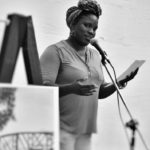 Elizabeth Ligawa is a recent graduate from Truett Theological Seminary, and the Diana R. Garland School of Social Work, earning both her Master of Divinity, and Master of Social Work. Though her prized role is being a mother to her dear son, Elijah, Liz has a love for encouraging people to come together in ways that engender healthy communities. Her role as the Director of Community Engagement at Prosper Waco allows her the room to work in and among the many faces of her beloved Waco community. She may be reached at [email protected].
Elizabeth Ligawa is a recent graduate from Truett Theological Seminary, and the Diana R. Garland School of Social Work, earning both her Master of Divinity, and Master of Social Work. Though her prized role is being a mother to her dear son, Elijah, Liz has a love for encouraging people to come together in ways that engender healthy communities. Her role as the Director of Community Engagement at Prosper Waco allows her the room to work in and among the many faces of her beloved Waco community. She may be reached at [email protected].
The Act Locally Waco blog publishes posts with a connection to these Aspirations for Waco. If you are interested in writing for the Act Locally Waco Blog, please email [email protected] for more information.
by Alexis Christensen
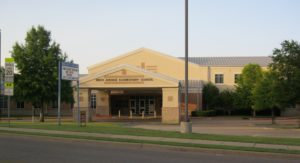 I have the privilege to work with three elementary schools within Waco ISD. They each have their unique strengths and challenges. Today though, I’m highlighting one campus in particular, West Avenue Elementary, located in the heart of North Waco on 15th Street.
I have the privilege to work with three elementary schools within Waco ISD. They each have their unique strengths and challenges. Today though, I’m highlighting one campus in particular, West Avenue Elementary, located in the heart of North Waco on 15th Street.
Waco Community Development began partnering with West Avenue in 2007. We started simply by asking people questions about their dreams and visions for their neighborhood and actively listened to their responses. Out of those conversations, our Family Engagement Program began. Today, when I ask people to describe what North Waco and West Avenue were like back then, I get responses like, “tore up” and “lots of prostitution and drug dealers” and “couldn’t see the good because of the bad.” When you looked at the neighborhood by the numbers during that time, it’s easy to see why people described their neighborhood like that. In 2009, there were 22 vacant retail/business spaces, 190 vacant residential lots, a poverty rate of 43%, and only 35% of residents were homeowners (NRS, 2009 & Census Bureau, 2000).
Yet, since the 2007-2008 school year, West Avenue has been rated by the Texas Education Agency (TEA) as Recognized, Academically Acceptable and Met Standard. And more recently, an assessment conducted by Waco ISD monitoring children’s Pre-Kindergarten readiness showed that West Avenue students were among the most ready to learn among their peers (CLI Engage Assessment). I believe it is worthwhile to take a deeper look at a few factors that helped lay the foundation for West Avenue’s success.
- In its fourteen year history, West Avenue has had 2 principals.
Andreia Foster was the first principal when the campus opened in 2002. Her “open door policy” allowed Waco Community Development and other organizations to work with students and families. Ms. Foster remained principal until 2014. Her twelve year tenure at a single campus created stability not only for families, but for the teaching staff as well.
Sheree Goodman, who taught at West Avenue for 10 years, agrees: “Low turnover [among staff] is connected to academic success, but we were more than co-workers, we became a family… a network was established. The staff was family-oriented and all stakeholders were included in every process. We always tried to do what was best for the kids; we truly believed in the students,” she said.
This legacy lives on through West Avenue’s “new” principal, Joseph Alexander, who just finished his second school year. Mr. Alexander’s motto is “No child is left behind at West Avenue.” This is demonstrated through his vigor and big dreams for his campus. He stated, “I want West Avenue to be a Blue Ribbon campus, a model for the State of Texas. Our students are the best in the state. We will do what other people say we can’t do with children from poverty. We believe that children can learn and will learn if given opportunity to be successful.”
These beliefs and core values both inspire and motivate students and teachers to be the best.
- Residents and community organizations are committed for the long haul.
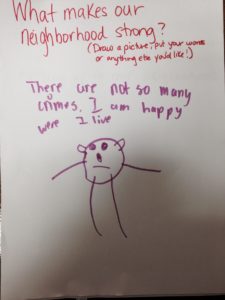 North Waco residents are not shy about their love for their neighborhood. An abundance of committed and trusted organizations and people live, work, worship and play in the neighborhood on a consistent basis. I would be remiss to try and name them all here; however, I’ve observed two main characteristics which distinguish these groups from others: their sustained commitment to learning from varying experiences and perspectives, and their deep held belief that trust is not a right due to them because of good intentions, but trust is a privilege to be earned. These practices are not cultivated overnight but develop with time.
North Waco residents are not shy about their love for their neighborhood. An abundance of committed and trusted organizations and people live, work, worship and play in the neighborhood on a consistent basis. I would be remiss to try and name them all here; however, I’ve observed two main characteristics which distinguish these groups from others: their sustained commitment to learning from varying experiences and perspectives, and their deep held belief that trust is not a right due to them because of good intentions, but trust is a privilege to be earned. These practices are not cultivated overnight but develop with time.
- Homeownership is growing in North Waco.
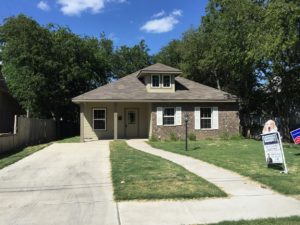 Homeownership is a major factor in creating neighborhood stability. A growing body of research points out that homeownership has the potential to positively impact educational goals.
Homeownership is a major factor in creating neighborhood stability. A growing body of research points out that homeownership has the potential to positively impact educational goals.
“Affordable and sustainable forms of homeownership can also help families achieve long-term stability. Research on the connection between homeownership and children’s education has found that homeowners tend to move less frequently than renters and that this may account for part of the difference in educational outcomes between children of homeowners and children of renters” (Holupka, C. Scott and Sandra J. Newman. 2010).
Waco Community Development was created with the lofty and ever galvanizing mission to inspire and cultivate healthy neighborhoods. In 2001, we joined the ranks of housing entities like Waco Habitat for Humanity and NeighborWorks who strived to create a culture of homeownership. For us, working within a geographically defined area proved to be a successful model. Today, the homeownership rate in Census Tract 12 (North Waco area) is 42%, an increase of approximately 7 percentage points from the 2009 sample data (Census 2014). We have seen vested homeowners become PTA officers, volunteers and mentors for students at West Avenue. One such Waco Community Development homeowner not only became the PTA Treasurer, but her son was valedictorian of his 5th grade class last May.
The complexity of factors influencing neighborhood development can make it difficult to understand what particular cause created a particular effect. There are schools of thought that believe this to be a negative thing, but I see a positive in the midst of the murkiness: It allows people and organizations to be interdependent when tackling difficult issues within our communities. It doesn’t excuse us from critically evaluating our work or from pursuing excellence; it simply means we have the opportunity to reach out to partners all around us to create even greater positive impact.
West Avenue has learned to lean on and be leaned upon and I think that’s a piece of why it’s experiencing such great success. Former teacher Ms. Goodman said it best, “The school is still a pillar. People know they can go there for anything they need and the partners have become resources for both the community and the school.”
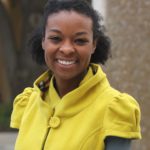 Alexis Christensen is a Community Organizer at Waco Community Development Corporation (Waco CDC) where she focuses on community building, leadership development and building collaborations.
Alexis Christensen is a Community Organizer at Waco Community Development Corporation (Waco CDC) where she focuses on community building, leadership development and building collaborations.
The Act Locally Waco blog publishes posts with a connection to these aspirations for Waco. If you are interested in writing for the Act Locally Waco Blog, please email [email protected] for more information.
by Ryn Farmer, Community Organizer, Waco Community Development Corporation (Waco CDC)
I have really been soul-searching over the last few years about what it means to be culturally competent. It is a term widely used in the social work field and has also gained a lot of traction in the medical field over the past few decades. I think it is something we need to really think about because we all come from such different experiences and ways of living. The idea behind “cultural competency” stems from the desire to respond respectfully across cultures and provide sensitive, holistic care to clients. It is about educating ourselves, before we meet people, about their culture so that we can respond thoughtfully and effectively. All of that sounds great, right? But for some reason this phrase has never really resonated with me.
Before I talk more about cultural competency, I want to make sure we are defining culture the same way. So as a basis for my thoughts, I’m defining culture as our traditions, norms, customs and beliefs in relation to gender, age, race, sexual orientation, socio-economic status, religion, language, etc. We operate from our core beliefs – both the internal and external elements that influence our life – and that affects (but does not determine) the way we think, how we behave and what we believe.
The phrase “cultural competency” indicates to me that we can arrive at something, that there is an ending point. That seems rather presumptuous because I know I could never be fully culturally competent. Of course, the philosophical underpinnings of cultural competency are good and desirable, and it is definitely a starting point. Many individuals won’t even begin a conversation about race, gender, sexual orientation, etc., because they are afraid they will say the wrong thing or because they have no idea what to say at all. We keep quiet because we are afraid of offending, or we decide to speak up and sound like a blundering idiot. So what is the answer? Don’t say anything at all and keep living in a world where deep injustice exists and too afraid to do anything? Speak from our limited knowledge and interactions with people and end up saying something foolish? Maybe there is another way… What if we approached culture in a slightly different manner? What if, instead of guiding our approach with the notion of “competence,” we approached with humility?
The idea of cultural humility is much more meaningful to me than cultural competency. In cultural humility, I can come from a place of learning rather than of expertise… a place of openness and of asking questions to better understand where someone is coming from, rather than assuming I already know them.
Dr. Melanie Tervalon and Jann Murray-Garcia have produced significant and meaningful information about cultural humility and describe it as a “life-long process of self-reflection and self-critique.” Self-awareness and reflection are the main ideas behind it, but there are other factors that come to play as well. It also involves recognizing and seeking to change power imbalances that exist in our communities and developing institutional accountability so that as institutions we are responding sensitively to the needs of people. For me, the notion of cultural humility takes away the idea that each culture has a set of rules that everyone follows. I think if we hold to the cultural competency way of thinking, then our interactions with people are limited to what we think are the beliefs and ways of living that exist in their “rulebook”.
I was at a meeting recently and one of the women at my table started speaking about how she wished we would quit viewing each other as objects and commodities but rather view each other as people. She talked about how we need to focus more on building relationships with each other first rather than focusing on yet another task to get done. We often assume we know each other because we run in similar circles or go to multiple meetings with the same people. But we don’t. We have only scratched the surface. So my friend was saying we need to take time to actually know each other. At the end of the meeting, my friend who said she didn’t want to be an object anymore was asked to lead a group. The person asking her said, “Because we need some color on our leadership team. And you’ve got color!” [Insert deep sigh of frustration and anger]. We have so far to go in being sensitive, in stopping to think about what we say before we say it and in truly looking at someone as a person. We must ask questions to really understand who someone is and not assume we know them because we have one gay friend, or one African American friend, or one Jewish friend.
If we really want to understand each other and start collaborating more together, we cannot paint a picture of any culture with a broad stroke of our brush. To do so would be foolish and circumscribed. So rather than viewing the individuals in our life as a token-something-or-other, why not actually view them as people? View them as someone with strengths to be discovered, and value them for what they can bring to the proverbial ‘table’ of life. Ask meaningful and engaging questions while coming from a place of appropriate inquisitiveness and openness. And before we do any of that, let’s start by seeking to discover our own beliefs and assumptions, and challenging ourselves in the idea that our values should be held above others.
We need to come from a place of learning. Of humility. And we need to never feel like we have arrived. Because when we believe we understand an individual because we think we understand their culture, we lose sight of the uniqueness of who they are and the gifts they can offer. Of course, there has to be grace and patience wrapped up in this whole process. I am so incredibly thankful for all of my friends who have poured out both of those things on me over the years as I struggle to better understand them. But I hope that if I, and others, come from a place of listening, of love, of reflection and of acceptance, we can accomplish a great deal more living in community together in this messy, beautiful and diverse world.
If you are interested in learning more about cultural humility, you can watch this 30 minute documentary produced by Vivian Chavez, an Associate Professor at San Francisco State. Also, my friend Jody Fernando has compiled incredibly thoughtful reflections from her blog Between Worlds into a book called Pondering Privilege: Toward a deeper understanding of whiteness, race, and faith.
 This Week’s Act Locally Waco Blog post is by Ryn Farmer. Ryn is a Community Organizer at the Waco Community Development Corporation (Waco CDC). Waco CDC helps to inspire and cultivate healthy neighborhoods. They consider a healthy neighborhood to be one that is safe, clean, and diverse; one in which it makes economic sense for people to invest and one where neighbors manage change successfully. If you would be interested in writing for the Act Locally Waco blog, please send an email expressing your interest to [email protected].
This Week’s Act Locally Waco Blog post is by Ryn Farmer. Ryn is a Community Organizer at the Waco Community Development Corporation (Waco CDC). Waco CDC helps to inspire and cultivate healthy neighborhoods. They consider a healthy neighborhood to be one that is safe, clean, and diverse; one in which it makes economic sense for people to invest and one where neighbors manage change successfully. If you would be interested in writing for the Act Locally Waco blog, please send an email expressing your interest to [email protected].

